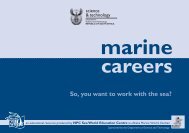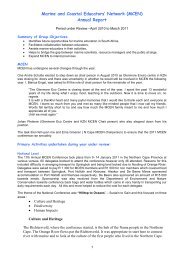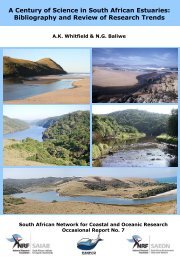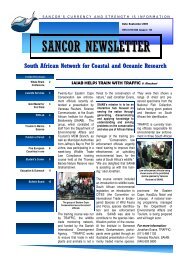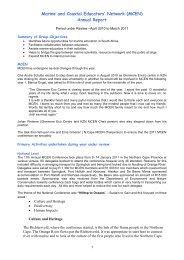Page 16<strong>SANCOR</strong> NEWSLETTER #<strong>200</strong>A different kind of Carnival ‐ Rio +20 dialogues: Ocean themeBy John FieldInvited to representMarine <strong>Research</strong> Institute – UCTThe 3rd World Summit on Sustainable developmentwas held in Rio de Janeiro, Brazil inJune 2012 and named “Rio +20”, coming 20years from the first summit and ten yearsaer the Johannesburg summit in <strong>200</strong>2. Anew feature of Rio +20 was the “Rio +20dialogues” arranged jointly by the Braziliangovernment and the UN Development Programme(UNDP) to publicise the event. Thedialogues were arranged in 10 themes, oneof which was Oceans; others including water,poverty, forestry, agriculture, …etc. Academicfacilitators (1 Brazilian, 1 from theNorth and 1 from the South) were appointedfor each theme, our job being to invite interestedcolleagues to contribute ideas, sugges‐ons and eventually, recommendaons forsustainable development in relaon to ourtheme.The Oceans facilitators came up with 10recommendaons, which were adversedon the web along with those of the other 9themes and the public was invited to vote onthem over a two‐week period. The Oceansrecommendaons were, (in order of popularityof the invited group):Launch a global agreement to save highseas marine biodiversityDevelop a global network of interna‐onal marine protected areas.Expand and implement internaonalinstuonal arrangements to protectthe marine environment from landbasedacvies.Promote the creaon of Marine ProtectedAreas designed and co‐managedby arsanal fishers as a suitable tool toensure marine governance and thesustainability of fisheries resourcesworldwideFishery management should be ecosystem‐based,making allowance for theneeds of all components of the ecosystem,including predators. Fishery management procedures shouldbe agreed among stakeholders wheneverpossible, with managementmeasures agreed in advance underrealisc scenarios of future ecologicaland fishery condions for several years. Create global ocean governance mechanismsto preserve biodiversity and genecresources in a scenario of growingnaonalizaon of the marine environment. Avoid ocean polluon by plascsthrough educaon and communitycollaboraon. Monitor and promote internaonalcoordinated research on ocean acidificaonand its effects on marine life andecosystems. As far as possible, fish captured in thewild should be used for human consumpon,with unmarketable by‐catchused for fishmeal.The first round of vong by the public choseNo. 8 as the most popular recommendaonso it automacally went forward to the summitmeeng of the heads of state. Next, in aone‐hour session, the facilitators explainedthe remaining recommendaons to thetheme panel, chosen by the Brazilian governmentin consultaon with UNDP. This panelof ten (very much a decimal system!) puttheir individual views to an audience ofsome 2,000 people at the 3‐day dialoguesmeeng at the new RioCentro convenoncentre on the outskirts of Rio de Janeiro. Thepanel included a son and grandson ofJacques Cousteau, and Sylvia Earle, and alsoother well‐known public figures. Aer ten“short” presentaons each urging the assembledcrowd to vote for their favouriterecommendaon, the assembly voted electronicallyfor the next recommendaon to goforward: Recommendaon 1 in the listabove. Finally the panel had the liberty offormulang their own recommendaon asthe third to go forward, so the three recommendaonsthat Sylvia Earle presented tothe Heads of State were: Avoid ocean polluon by plascsthrough educaon and communitycollaboraon. Launch a global agreement to save highseas marine biodiversity. Take immediate acon to develop aglobal network of internaonal marineprotected areas, while fostering ecosystembased fisheries management, withspecial consideraon for small‐scalefishing interests.However, in parallel to the Dialoguesmeengs described above, the governmentalministries were negoang the text ofthe document to be signed by the Heads ofState, a process we that we heard wasfraught with oen acrimonious argument asthe original dras were watered down inaempts to reach consensus. Thus by theme the Heads of State assembled in thedays following the dialogues, the text hadalready been negoated and there was lileprospect of the three minutes allocated forpresentaon by each theme rapporteurmaking any difference to the outcome.In summary, the Rio Dialogues were an interesngexperiment that succeeded in involvingmany more people than would otherwisehave been there, and publicised the eventand issues, but made no difference to a disappoinngoutcome for the summit. Thiswas to be expected, given the serious economicand polical issues being confronted,and symbolised by the absence of the Headsof State of the USA, UK and Germany. Asusually happens in polics, short term issues(such as re‐elecon) take precedence overthe serious long term issues facing our planet.
Page 17<strong>SANCOR</strong> NEWSLETTER #<strong>200</strong>When talking science alone does not get the message across!By Pavs PillayMarine <strong>Research</strong> Institute – UCT“Knowledge alone does not yield appropriateacon.” – Naomi Oreskes (2010)In June <strong>200</strong>5 Steve Jobs, Apple Macintoshfounder, encouraged Stanford graduates to“Stay Hungry. Stay Foolish” – nowhere canthe hunger for knowledge be more clearlyseen than in a young learners eyes whenthey gaze upon a marine touch tank or shudderin ancipaon and excitement whenasked to touch a starfish or squeak withdisbelief when you show them a picture of aSpanish dancer nudibranch or an animaonof an ocean glider! Inially young learnershave an innate respect for the planet and itsresources but then they grow up!By the me learners get to high school,many have lost the thirst for knowledgealong with a decline in the understanding ofscience. Even more startling there seems tobe a loss of concern in the environmentshealth and a dislocaon from being part ofthe earth’s ecosystem. Along with this disassociaonfrom and disinterest in the naturalenvironment, many live in a world of instantmessaging, Facebook, Twier, bbming andreality television, a combinaon of instantsasfacon and short‐term success. So howdo we keep learners hungry for science andbased on the current environmental criseswe are facing, how do we get them to thinkand act responsibly?One way through which Ma‐Re is trying toget learners submerged into marine scienceand related environmental aspects isthrough learner parcipaon in the teachingprocess and in integrang current socialmedia networks (Facebook, Twier etc.) intofun and engaging acvies. Most effecveundertakings have involved geng leanerscompletelyimmersedin thetask.Oneacvitythat hasparcularlyworkedwell hasbeenthedevelopment of a murder mystery gamearound a marine theme.Picture this – a fishing vessel that is notoriouslyknown for illegal fishing comes intoport with a dead observer on board. Analysesof the evidence and the blood found atthe crime scene reveals that the blood wasnot only the vicm’s blood but also theblood of another person (possible the killer).The game comprises of developing charactersketches of the observer, the fishing crew,the fishing company, and various other nefariouscharacters. The more creave youare the beer the game! Get a cast of postgraduatestudents together to act out thecharacters. Then set the scene for the learnersand get them to solve the murderthrough interviews and observaon of astaged crime scene. Go even as far as sengup a fake Facebook <strong>page</strong> or Twier accountwith news of the death, the illegal fishingand using your mobile phone send updates,giving clues and misinformaon during thegame. Give the learners access the site byprojecng the Facebook <strong>page</strong> via a dataprojector on a wall in the room. CSI – MarineScience Style!The game is highly interacve with the learnersconducng interviews with charactersand false pieces of informaon and evidencebeing fed to them. All the while learnerslisten and learn, by mere conversaon, readingthe Facebook <strong>page</strong>, interacon andsomemes interrogaon, about DNA, DNAprofiling, the DNA database, marine observers,sustainable marine resource, SASSI, thefishing industry etc. Aer two, somemesthree fun‐filled hours, learners using justobservaonal and circumstanal evidencepredict who the killer(s) are. You then revealthe killer(s) using DNA sequencing along withother more conclusive observaonal evidence– something that you would havesetup at when developing the game. Whenleaving the classroom, amidst much chaerand excitement, learners say that the sessionhas made them eager to learn more aboutsolving a murder using DNA, illegal fishing,the power of observaon and wanng to beforensic sciensts, marine biologists andsome such things, all the while sharing talesand anecdotes of their interviews with thecharacters in the most animated ways.Clearly then using such methods and mechanismsof outreach Ma‐Re hopes to keepyoung learners staying “hungry” forknowledge and a lile less “foolish”.



